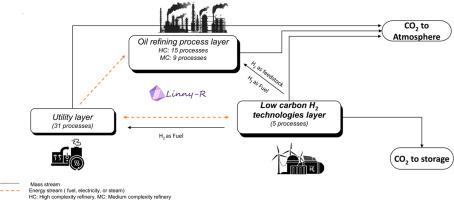Assessing the impacts of low-carbon intensity hydrogen integration in oil refineries
引用次数: 0
Abstract
This paper evaluates the potential impacts of introducing low-carbon intensity hydrogen technologies in two oil refineries with different complexity levels, emphasizing the role of hydrogen production in reducing CO2 emissions. The novelty of this work lies in three key aspects: Comprehensive system analysis of refinery complexity using real site data, integration of low-carbon Hydrogen technologies, long-term and short-term strategies. Two Colombian refineries serve as case studies, with technological solutions adapted to their complexity levels. The methodology involves evaluating different options for hydrogen production, accounting for improvement in technological efficiency over time.
The refinery systems were evaluated in a cost-optimization model built in Linny-r. Three different scenarios were considered, Business-As-Usual (BAU), high, and low-ambitions decarbonization scenarios, focusing on the time horizons of 2030 and 2050.
When comparing the two case studies, the preferred decarbonization strategy for both facilities involves the substitution of SMR technology with water electrolyzers powered by renewable electricity. Post-2030, biomass-based hydrogen technology is still a costly alternative; however, to achieve CO2 neutrality, negative emissions storage of biogenic CO2 emerges as an achievable alternative.
Our results indicate the achievability of CO2 reduction objectives in both refineries. Our results show that achieving long-term CO2 neutrality requires both refineries to increase renewable electricity production by 5 to 6 times for powering water electrolyzers, steam production by 2 to 2.5 times for CO2 capture, and supply of dry biomass by 2.6 to 4.5 kt/d.
The two most significant factors influencing the refining net margin in the decarbonization scenarios are primarily the CO2 and the renewable electricity prices. The short-term horizon emerges as the pivotal period, particularly within the high-ambition decarbonization scenarios. In this context, the medium complexity refinery demonstrates economic viability until a CO2 price of 140 €/t CO2, while the high complexity refinery endures up to 205 €/t CO2.
The high complexity refinery is better prepared to face the challenges of decarbonization and the impacts generated on the refining margin. Compared to the BAU scenario, the high complexity refinery shows a negative impact on the net margin that corresponds to a 40 % and 5 % reduction in the short and long term, respectively. Meanwhile, for the medium complexity refinery, the impact on net margin amounts to a 52 % reduction in the short term and a 27 % improvement in the long term.
Furthermore, our research highlights the significant potential for reducing CO2 emissions by fully eliminating the use of refinery gas as fuel, providing alternative applications for it beyond combustion.

炼油厂低碳氢一体化的影响评估
本文评估了两家不同复杂程度炼油厂引入低碳氢技术的潜在影响,强调了制氢在减少二氧化碳排放中的作用。这项工作的新颖之处在于三个关键方面:利用真实现场数据对炼油厂复杂性进行综合系统分析,整合低碳氢技术,长期和短期战略。两家哥伦比亚炼油厂作为案例研究,采用了适应其复杂程度的技术解决方案。该方法包括评估氢气生产的不同选择,考虑到技术效率随着时间的推移而提高。在Linny-r中建立的成本优化模型中对炼油厂系统进行了评估。研究人员考虑了三种不同的情景,即照常营业(BAU)、高目标脱碳情景和低目标脱碳情景,重点关注2030年和2050年的时间范围。在比较两个案例研究时,两个设施的首选脱碳策略都涉及用可再生电力驱动的水电解槽取代SMR技术。2030年后,基于生物质的氢技术仍然是一种昂贵的替代方案;然而,为了实现二氧化碳中和,生物源二氧化碳的负排放储存成为一种可实现的替代方案。我们的结果表明,这两个炼油厂的二氧化碳减排目标是可以实现的。我们的研究结果表明,要实现长期的二氧化碳中和,需要两家炼油厂将可再生电力产量提高5至6倍,为电解水提供动力,将蒸汽产量提高2至2.5倍,以捕获二氧化碳,并将干生物质供应提高2.6至4.5千吨/天。在脱碳情景下,影响炼油净利润率的两个最重要因素主要是二氧化碳和可再生能源电价。短期将成为关键时期,特别是在雄心勃勃的脱碳方案中。在这种情况下,中等复杂程度的炼油厂在二氧化碳价格达到140欧元/吨之前具有经济可行性,而高复杂程度的炼油厂可以承受高达205欧元/吨的二氧化碳。高复杂性炼油厂能够更好地应对脱碳的挑战和对炼油利润的影响。与BAU方案相比,高复杂性炼油厂对净利润率的负面影响分别相当于短期和长期减少40%和5%。与此同时,对于中等复杂程度的炼油厂来说,对净利润率的影响在短期内减少了52%,在长期内提高了27%。此外,我们的研究强调了通过完全消除炼油气作为燃料的使用来减少二氧化碳排放的巨大潜力,为其提供了燃烧以外的替代应用。
本文章由计算机程序翻译,如有差异,请以英文原文为准。
求助全文
约1分钟内获得全文
求助全文

 求助内容:
求助内容: 应助结果提醒方式:
应助结果提醒方式:


